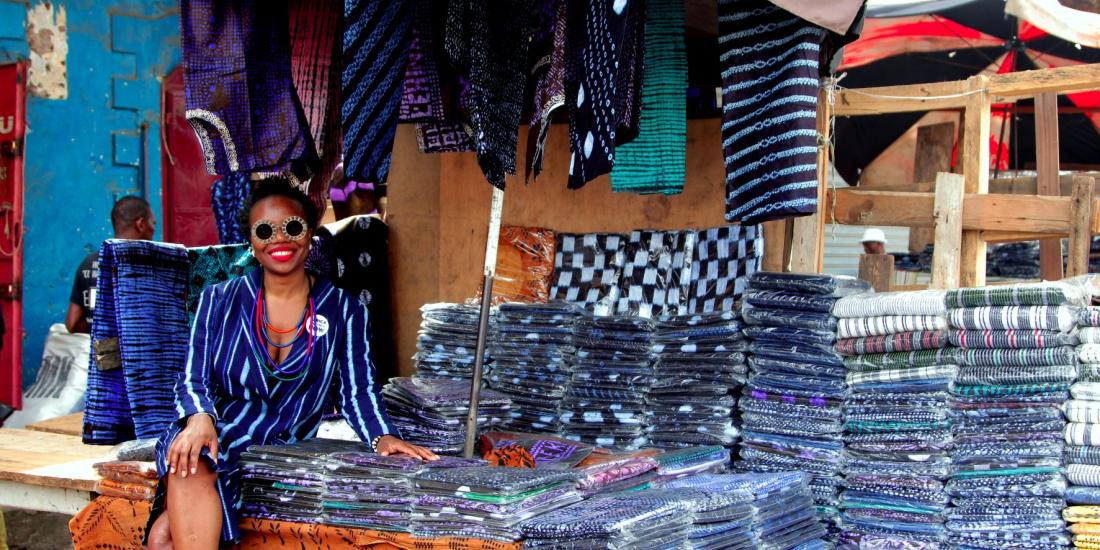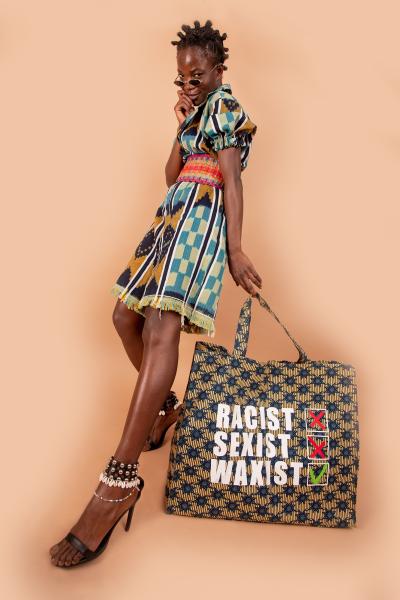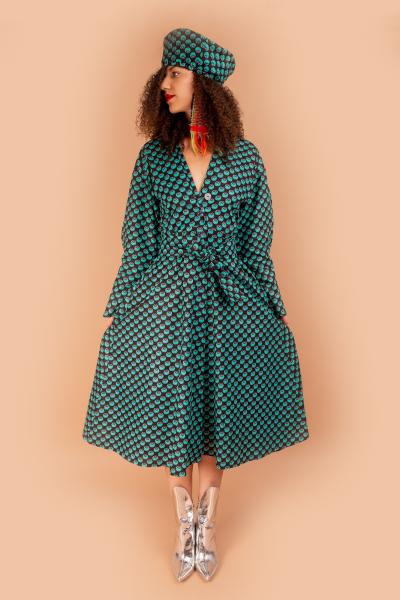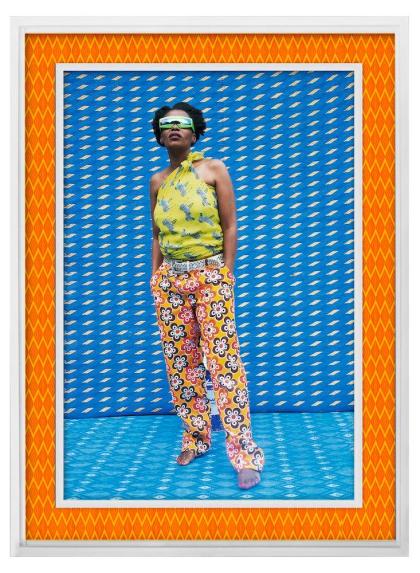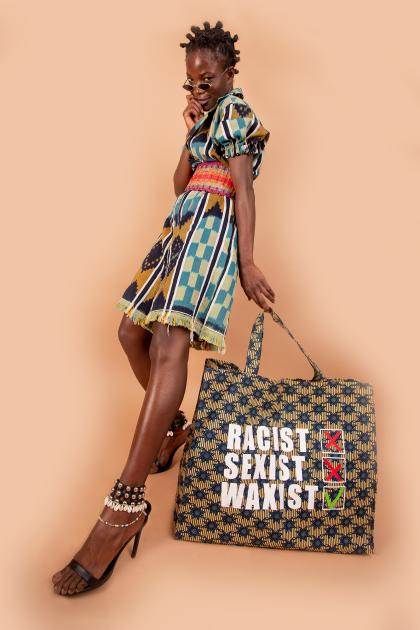Were you destined for a career in fashion?
Not at all, it is more the result of a life path. That said, I have always loved fashion. My father also bought a lot of clothes, while my mother was much more restrained so she could really take the time to choose. I am of Guinean origin but I grew up between Guinea, Tanzania and Ghana, as my father was a diplomat... That's why I always liked fabrics that came from elsewhere. In Ghana, for example, my mother would take us to craftspeople. So even though I have always been close to clothing, I was not destined to have a career in fashion.
How did fashion come into your life?
Through the realisation that there was a deficit of African representation in Belgium, which clothing could fill. And this realisation came about as a result of two successive events. My daughter, who must have been 6 or 7 at the time, came across a flyer for a water park she wanted to go to. But the photos that illustrated it only showed white families. I then saw in her the look of a little girl who could not recognise herself in the images she was seeing... It was very strong. Something clicked. We had just come back from a trip to Senegal, where I had bought a lot of different textiles for my personal use, and I said to myself, this is what I have to do to fill this gap, it will be through clothing, which is a universal language, which reflects me, reflects my daughter and demonstrates the complexity of our identities by bridging the gap between Belgium, where I have been living since I was 16 years old, and West Africa, where I am originally from. It would not be just "clothing for clothing's sake" but I would say things, tell stories, through it. This is where my brand name, "Erratum", came from. When we make a mistake, we correct it with an erratum. That's what I'm trying to do by correcting this representation deficit.
How does this manifest in your creations?
I mainly work with African textures such as woven loincloths, batik, indigo and wax, which I like a lot, in spite of its history; it comes from Indonesia, but was brought to West Africa by colonists and the African populations eventually appropriated it... So this textile, which is also the basis of my work, is already the bearer of a rich and complex history. I always make models that I like, I'm my own first customer in a way (laughs). It's my way of expressing my multiple identities with fabrics that you can tell at first glance come from somewhere else. I am Belgian and my Africanity is also part of my Belgian identity.
Not coming from the fashion world, did you have difficulties growing your business?
Yes and no, because when you don't yet have codes, you are necessarily freer. Of course I made mistakes, but it's not a big deal because it's a lifelong journey. My brand has been around for six years, it still has a lot of teething problems to deal with and the whole process is very exciting! Especially if, like me, you want to involve essential values in your work. I am really using a slow fashion process. Everything is produced in Belgium, with workshops that employ people in social and professional reintegration. We take the time to do things right, in very reasonable quantities, while allowing people to perfect their craft and thus become socio-economically integrated. All this is very important to me. Of course, since the material I use is of excellent quality and I bring it from West Africa and produce in small quantities, thus creating fairly exclusive pieces, my prices are inevitably higher than those charged by the big fast fashion companies. What's great is that I'm lucky enough to have a cosmopolitan clientele, from all over the world, because I've always thought that even though my pieces are inspired by my personal story, they tell universal stories, for women who are curious about things and love to travel. And I'm very happy that I've been able to reach these people. This is also why I totally reject those who call my fashion "ethnic". No, my fashion is not ethnic. Creations of Afropolitan inspiration are also universal.
How many collections per year do you offer?
I do not work by collections but depending on the fabrics I find in West Africa. So it also takes time to get them here. I am not bound by a schedule and I am fortunate to have a loyal clientele. I regularly offer new pieces in very small series, five pieces per design, no more.
Is this also the case for the designers participating in the fashion and design part of the Afropolitan Festival?
Yes. I have brought together 13 exhibitors established in Europe, with multiple identities. How can some people talk about "African fashion" when the African continent comprises 54 countries and many more identities! So, with this fashion pop-up, I am trying to show the diversity, dynamism and innovation of African and Afropolitan fashions, but which all share the values that are dear to me - and that can be found in my work - such as respect for the environment and humans and the quality of the produced pieces, which carry universal messages. Contrary to the preconceived ideas that continue to target Africa, we too create wealth and added value. And it is fundamental to detach the representation of Africa from the bleak stereotypes that are often aimed at it. We will be exhibiting brands, each with its own unique story. And for a brand to live, it must be supported and consumed. People would like to wear eco-friendly brands, which is quite commendable. But the reality is that this eco-responsibility comes at a cost and for them to exist, you have to come and buy their items, you have to follow them on Instagram and social media, and you have to share their images and posts. These are brands produced by self-employed people who passionately invest their time, money and energy so they can't offer prices as low as those of fast fashion, but their items have real value, they are unique and worth consuming because they express our uniqueness. So maybe it's better to invest in an original piece that is a bit more expensive instead of buying several cheaper pieces that are produced in large quantities. We must never forget that we build the world as we consume it... Alongside the fashion pop-up, we are also showing a very inspiring film, The ones who keep walking, by the young Nigerian director Amarachi Nwosu. This documentary features these new African and Afropolitan creatives, boundary-pushers who are shaping Africa on new foundations. The film will be followed by an epic fashion performance that celebrates the resilience and power of women.
This year's Festival is dedicated to the emancipation of Afropolitan women. Is that what you are seeing as well?
For me, women have always had an important place in African and Afrodescendant societies. It is women who have always made things evolve, but the real difference is that they are now being socially recognised for the role they have always held in the private sphere. In this regard, it is a fair return; we are witnessing the collective recognition of the importance of their contribution. And as a woman, and the mother of two young girls, it is very exciting to witness and be a part of this movement.
